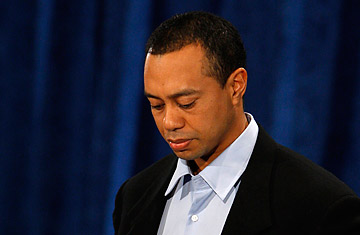
Golfer Tiger Woods apologizes for his sexual affairs during a press conference at the headquarters of the PGA Tour in Ponte Vedra Beach, Fla., on Feb. 19, 2010
Human failure is inevitable. Mechanical failure is unexpected. What makes Tiger Woods' story so compelling is that it's a case of both. Nowhere was that clearer than in his press conference on Friday.
Woods' brand and golf game were built on his machine-like qualities. He was the guy who delivered the same result over and over. At his sport and in his business dealings, he was flawless, unfailing, programmable. So when his private behavior proved that he had huge, gaping weaknesses, both Woods the human and Woods the moneymaking machine took a big hit. Will his apology on Friday turn that around? The answer seems to be twofold. The man may now be forgivable, but the brand still needs a lot of oiling.
For a guy who has made a career out of maintaining control over his emotions, Woods' apology seemed refreshingly wobbly. The nervous man at the mike was a Tiger Woods many people had never seen before. There was a catch in his voice, and his delivery was tense. The fact that Woods is not a fluent public speaker probably worked in his favor. If sentences like "I'm embarrassed. That I have put you. In this position," sounded a little Terminator-esque, they could be forgiven, given the circumstances. (The setting, with a weird blue "magic show" velvet curtain didn't help the awkwardness either.)
While his wife Elin Nordegren was a no-show — a situation that crisis professionals never think is optimal — he quoted her and went out of his way to defend her reputation, bristling at the suggestion that she might have hit him with a golf club. He owned up to all that he had done to her and others in the room. "He had all the key elements of an effective apology," says W. Timothy Coombs, Ph.D., a professor of crisis communication at Eastern Illinois University. "I think it is important he noted his future behavior was the true mark of an apology to his wife, his family [and] to his friends and fans."
And Woods had the next best thing to a wife with him: a mom. The cameras caught Tida Woods looking down, barely able to watch her son during the unusually long apology, whether out of shame or compassion. "The ending hug with his mother may have been the most humanizing moment," says Kenneth Shropshire, a professor of sports marketing at Wharton business school. "It really did deliver that this is, apart from all the elements us gawkers are focused on, a family matter."
As for the Woods brand, the future is still murky. Like Toyota — which also has a problem with not stopping when it should — Woods kept reminding the public, I've done some good things and I'm doing everything to make sure that I'm reliable in the future; this weird tendency I have to surge in places I perhaps shouldn't will be fixed.
Was it enough? Not to everyone. "For Tiger the brand, the apology is an epic fail," says Coombs. "It is too little too late. Many sports writers have mocked today's media event, saying no self-respecting journalist would attend because you can't ask questions. When the media mocks the format of your apology, then it's a failure regardless of the content." Paul Furiga, president of WordWrite Communications, agrees, saying, "What is the takeaway? The headline? The moral of the story? Tiger failed to deliver one that is clear and compelling." There is still no alternative label for Woods than cheater.
Woods did not say when he will return to golf. This was probably a shrewd move, since he needs to prove to everyone that he is focusing on fixing himself and making things right with his family. The question is, How long will he wait? Like Nordegren, many companies may reserve their judgment about getting back into bed with him until they see whether he's being genuine. Unlike Nordegren, however, they will need to see him win some golf games before they're even tempted.
